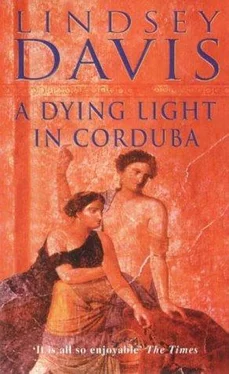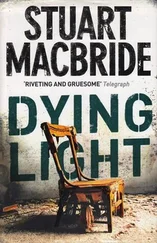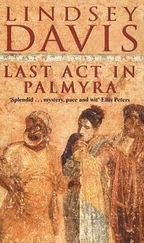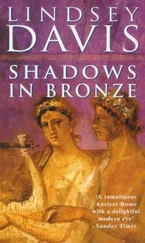Lindsey Davis - A dying light in Corduba
Здесь есть возможность читать онлайн «Lindsey Davis - A dying light in Corduba» весь текст электронной книги совершенно бесплатно (целиком полную версию без сокращений). В некоторых случаях можно слушать аудио, скачать через торрент в формате fb2 и присутствует краткое содержание. Жанр: Исторический детектив, на английском языке. Описание произведения, (предисловие) а так же отзывы посетителей доступны на портале библиотеки ЛибКат.
- Название:A dying light in Corduba
- Автор:
- Жанр:
- Год:неизвестен
- ISBN:нет данных
- Рейтинг книги:3.5 / 5. Голосов: 2
-
Избранное:Добавить в избранное
- Отзывы:
-
Ваша оценка:
- 80
- 1
- 2
- 3
- 4
- 5
A dying light in Corduba: краткое содержание, описание и аннотация
Предлагаем к чтению аннотацию, описание, краткое содержание или предисловие (зависит от того, что написал сам автор книги «A dying light in Corduba»). Если вы не нашли необходимую информацию о книге — напишите в комментариях, мы постараемся отыскать её.
A dying light in Corduba — читать онлайн бесплатно полную книгу (весь текст) целиком
Ниже представлен текст книги, разбитый по страницам. Система сохранения места последней прочитанной страницы, позволяет с удобством читать онлайн бесплатно книгу «A dying light in Corduba», без необходимости каждый раз заново искать на чём Вы остановились. Поставьте закладку, и сможете в любой момент перейти на страницу, на которой закончили чтение.
Интервал:
Закладка:
'Any reason for not using him?'
For once Optatus smiled. 'Ours was a remote cousin.'
Norbanus, however, is the most well known. He is chief of the guild of negotiators at Hispalis. He also has his own office at Ostia, in the port of Rome.'
'He's well-to-do, then. And Cyzacus must be top man among the Baetis bargees?'
'You have heard of Cyzacus?'
'You mean, how do I know he's the tribal chief? I worked it out Attractus appears to go for the most prominent men. So how do they all get on together? Norbanus and Cyzacus seemed to be deep in gossip. Are the two estate owners close drinking cronies too?'
'Shippers and landowners exist in mutual contempt, Falco. Cyzacus and Norbanus would have been lucky to get anybody else to speak to them. They and the producers spend most of their lives trying to mislead each other about prices or complaining about late deliveries, or how the oil has been handled… As for Annaeus and Licinius, they are in the same business as each other, so they are rivals in earnest.' That was good news. Wedges might be inserted here. This is how conspiracies are toppled by agents who know how. We find a cosy clique, which has internal rivalries, and we nimbly cause dissent. 'One difference is, the Annaeii came from Italian stock many years ago, the very first Roman settlers here. The Rufii are of pure Spanish origin and have ground to make up.'
'I see you have plenty of local snobberies!'
'Yes, people who have vital interests in common do love to despise one another for grand reasons.'
'Tell me, what makes the two olive growers hate each other? Is it purely commercial jostling?'
'Oh, I think so. There is no deadly quarrel,' Optatus told me rather wryly, as if he assumed I thought provincial towns were hotbeds of family feuds and intriguing sexual jealousy. Well, no doubt they had their fun, but making money took precedence. On the other hand, in my work, when people denied the existence of strong emotions, it was usually a prelude to finding corpses with knives in their backs.
We had reached the villa rustica. I could hear Nux barking, probably in protest because Helena had locked her up. I made my retreat before Optatus could remember his heartache over the torn-up tree.
XXII
Corduba sits on the north bank of the River Baetis, overlooking a fertile agricultural plain. Marmarides drove Helena and me there the next day. Where the navigable water petered out into spongy pools and channels we crossed a bridge, made of stone, which everyone claimed replaced one that Julius Caesar had built. Even in April the river was virtually fordable at this point.
Corduba has an old local history, but had been founded as a Roman city by Marcellus, the first Roman governor of Spain. Then both Caesar and Augustus had made it a colony for veteran soldiers, so Latin was the language everyone now spoke, and from that staged beginning must have come some of the social snobberies Optatus had described for me. There were people with all sorts of pedigrees.
Even while it was being colonised the district had a turbulent history. The Iberian landmass had been invaded by Rome three hundred years ago – yet it had taken us two hundred and fifty to make it convincingly ours. The numerous conflicting tribes created trouble enough, but Spain had also been the entry route for the Carthaginians. Later it made a fine feuding ground for rivals every time prominent men in Rome plunged us into civil war. Corduba had repeatedly featured in sieges. Still, unlike most large provincial centres I had visited, mainly on the frontiers of the Empire, there was no permanent military fort.
Baetica, which possessed the most natural resources, had yearned for peace – and the chance to exploit its riches – long before the wild interior. At home in the Forum of the Romans was a golden statue of Augustus set up by wealthy
Baeticans in gratitude for his bringing them a quiet life at last. How quiet it really was, I would have to test.
We passed a small guardhouse and crossed the bridge. Beyond lay stout town walls, a monumental gate and houses built in the distinctive local style of mud walls topped with wood; I discovered later the town had a prominent fire brigade to cope with the accidents that endanger timber buildings in close-packed urban centres where! amp oil is very cheap. They also boasted an amphitheatre, doing well according to a rash of advertising placards; various bloodthirsty-sounding gladiators were popular. Aqueducts brought water from the hills to the north.
Corduba had a mixed, cosmopolitan population, though as we forced a passage through the twisting streets to the civic centre we found the mixture was kept strictly separate – Roman and Hispanic areas were neatly divided by a wall running west to east. Notices carved on wall plaques emphasised the divide. I stood in the forum, labelled as Roman, and thought how odd this strict local schism would seem in Rome itself, where people of every class and background are thrust up against each other. The rich may try to keep apart in their mansions, but if they want to go anywhere – and to be anyone in Rome you must be a public man – they have to accept being buffeted by the garlic- eating hordes.
I had a good idea that in Corduba both the elegant Roman administrators and the aloof, inward-looking Baeticans would soon find themselves in a close pact on one subject: disapproval of me.
Like all decent tourists we had made our way first to the forum. It was in the northern sector. As soon as we enquired for directions I learned that the governor's palace was back down by the river; distracted by talking to Helena, I had let myself be driven past it. Helena and Marmarides, who were keen to see the sights, went off to explore. Helena had brought a town plan left behind by her brother. She would show me any decent landmarks later.
I was obliged to register my presence with the proconsul of Baetica. There were four judicial regions in this sun- drenched province – Corduba, Hispalis, Astigi and Gades. I knew therefore that there was only a one in four chance of finding the governor at home. Since the Fates regard showering me with disappointment as a good game of dice, I expected the worst. But when I presented myself at the proconsular palace, he was there. Things were looking up. That didn't mean I could get the mighty man to meet me.
I set myself a pleasant wager: seeing how soon I could wangle an official interview. I tried to make my approach subtle, since there was an obvious need for secrecy. A simple request fell flat. Producing a tablet with the dignified seal of Claudius Laeta, Chief of Correspondence to the Emperor, obtained mild interest among the flunkies, who must have written Laeta's name on a few thousand dreary communiques. One neatly cropped fellow said he would see what he could do then ducked out into a corridor to discuss his last night's wine consumption with a friend. I put on the bleak expression auditors wear when tasked to eliminate excessive staff numbers. Two other relaxed lads put their heads together and worked out their order for lunch.
There was only one thing for it. Dirty tactics.
I leaned against a side table and whittled my nails with my knife. 'Don't hurry,' I smiled. 'It's not going to be easy informing the proconsul his great-grandfather has finally died. I wouldn't have minded the job, but I'm supposed to explain about the old blighter changing his will, and I just don't see how I can do that without mentioning a certain little Illyrian manicurist. If I'm not careful we'll be getting into the business of why his honour's wife didn't go to the country as instructed, and then the ding-dong with the charioteer will slip out. Jove knows they should have kept it quiet but of course her doctor talked, and who can blame him when you hear where the proconsul's spare epaulettes were sewn -' Both the flunkey in the corridor and his friend stuck their heads slowly round the door to join the others staring at me goggle-eyed. I beamed at them. 'Better not say any more, even though it is all over the Senate. But you heard it from me first! Remember that when the drinks are being got in…'
Читать дальшеИнтервал:
Закладка:
Похожие книги на «A dying light in Corduba»
Представляем Вашему вниманию похожие книги на «A dying light in Corduba» списком для выбора. Мы отобрали схожую по названию и смыслу литературу в надежде предоставить читателям больше вариантов отыскать новые, интересные, ещё непрочитанные произведения.
Обсуждение, отзывы о книге «A dying light in Corduba» и просто собственные мнения читателей. Оставьте ваши комментарии, напишите, что Вы думаете о произведении, его смысле или главных героях. Укажите что конкретно понравилось, а что нет, и почему Вы так считаете.












